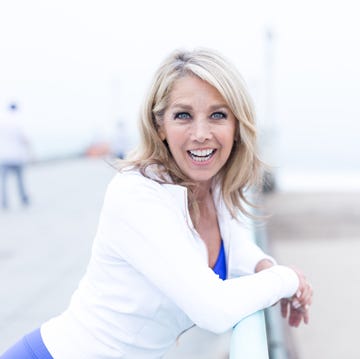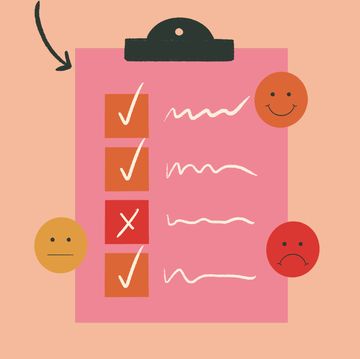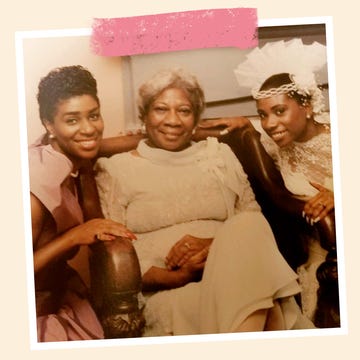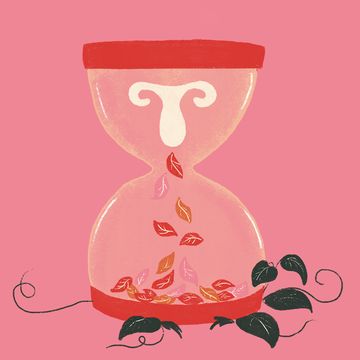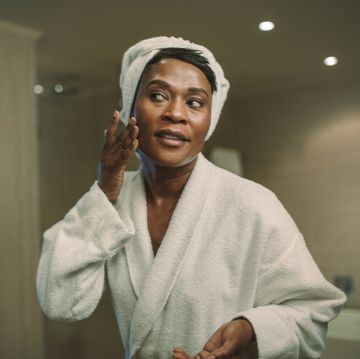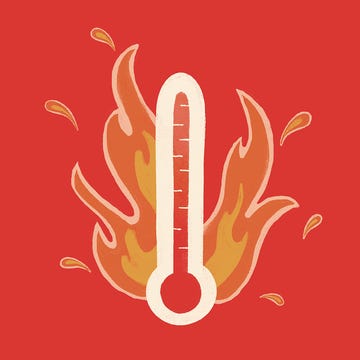At 44 years old, I have spent the last few years dealing with heavier, unpredictable menstrual cycles, unexplained weight gain and night sweats that leave the bedsheets plastered to my skin. When I asked one doctor if it could be perimenopause I was told “you’re too young for that.” But I wasn't so sure.
This past March, Canyon Ranch launched the M/Power Menopause/Perimenopause retreat at their Lenox, MA, location. When I was offered a free spot at the inaugural retreat as a women’s health and wellness journalist, I was excited to see what it could offer not only professionally but personally. Here are my biggest takeaways.
We need this level of care for every woman.
At the start of the retreat we went around the table introducing ourselves — names, places of origin and why we signed up. It quickly became clear that I wasn’t alone, not only with my unbalanced hormone struggles, but with not feeling heard in the doctor’s office. Every single woman who attended the retreat reported that they were spending their money and the time away from their families because they felt like healthcare professionals weren't listening, didn't believe them or didn't have the time to spend with them.
To wit: For 22 years, Jen Baker-Porazinski, M.D., Canyon Ranch’s resident physician, worked in rural New York State where she would get 10 minutes with each patient and barely had time to use the bathroom or eat lunch. It’s because of her experience that she relishes the time she gets with patients now.
It's a privilege to partake in a wellness retreat like M/Power — the level of testing and time Canyon Ranch’s health professionals spent with me was incredible. My four days at the retreat included tests that every woman over 40 should push for including a DEXA (Dual-Energy X-ray Absorptiometry) scan to check my bone density and an extensive panel of bloodwork including hormones so I could have a clearer idea of what my body was up to — without the guessing.
While the CDC recommends a DEXA scan for women who are 65 years old or older, or 50 and older with certain risk factors, bone loss begins in our 30s and 40s. If you’re someone with a high risk of osteoporosis — including being a heavy smoker or drinker, taking certain medications or having a family history of the disease — it could be in your best interest to get a scan before you hit menopause and the bone degeneration accelerates. Unfortunately, some health insurance plans won't cover a DEXA scan for younger women and it can cost several hundred dollars out of pocket.
On top of comprehensive testing, this retreat also included an hour with Dr. Baker-Porazinski, an hour with a nutritionist or mental health therapist and informational sessions about the basics of menopause and perimenopause, exercise, nutrition and alternative therapies for symptoms. Plus, everyone got a personal virtual follow up with Dr. Baker-Porazinski a week later to go over bloodwork results and create an action plan for better health. I have never felt more cared for in my adult life.
Protein and strength training are critical for bone health.
Cardio is important for heart health, but for women who are entering perimenopause and menopause, strength training is equally important. As Dr. Baker-Porazinski says, “strength training helps women maintain muscle, which is essential for bone health." This type of exercise bolsters bones by putting stress on them and it results in stronger muscles, which lowers your risk of falls (and fractures).
To help us get started, Liz Plosser, a certified trainer, former editor-in-chief of Women's Health and now author of the popular health-focused substack Best Case Scenario, led a session on weight training. She recommends adding it to your routine slowly so you don’t risk burnout or injury. Thankfully, it shouldn't require a huge financial or time commitment to reap the benefits: “Two to three times a week, light weights or body weight, push and pull moves such as lunges, squats, overhead presses and planks,” suggests Plosser.
Also discussed was the importance of protein and amino acids, the molecules responsible for building protein and enabling our bodies to function properly. As women approach menopause and the risk of osteopenia and osteoporosis increases, Dr. Baker-Porazinski points out that adequate protein intake is essential for muscle maintenance and supporting strong bones. The Recommended Dietary Allowance (RDA) for protein is .36 grams per pound of body weight, but there's a calculator to help you do the math.
When I asked Plosser if protein was beneficial for someone like me who didn’t spend hours at the gym, but did some weight training in between writing assignments, she surprised me by nodding enthusiastically. “Our bodies aren’t as efficient at building and maintaining muscle during midlife as they once were, so we need to be more consistent and intentional," says Plosser. "Even on rest days, I make sure to get high-quality protein and aminos in. It’s not just about recovery from workouts — it’s about sending my body the message to stay strong, steady, and ready for whatever’s next.”
Alternative therapies can help.
During the retreat, we discussed the benefits of Hormone Replacement Therapy (HRT) and even a low dose of birth control to help increase estrogen levels, but alternative therapies were given equal attention.
One afternoon, our group reclined on couches in a quiet room while being talked through a hypnosis session to alleviate hot flashes. It might sound surprising, but a recent scoping review showed that compared to cognitive behavioral therapy (CBT), hypnosis was more effective in reducing the frequency and severity of hot flashes: After the first week of hypnosis practice, there was a decline on average of about 30% and then a whopping 70% by the fourth week. Because it requires more than one session, we were told to record ours so we could use it at home.
Another morning, we met in the back room of the spa, where beside the enticing hot tub was a not-so-enticing cold plunge pool. A 2024 study found that women who did consistent cold-water swimming for two months reduced their menopausal and perimenopausal symptoms including hot flashes, anxiety, mood swings and irritability. Two by two, we did our breath work, locked eyes with our cold plunge coach and submerged up to our neck for as long as we could manage. As painful as entering the pool was, my body felt balanced and tingly for the rest of the day.
A support system is key.
One of the most beautiful results of the four-day retreat is our group text. While I suggested Menopause Misfits for the chat group name, we went with Powerful Women. Every now and then a text will come through from one of my new M/Power retreat friends with a funny menopause meme, a review of a protein powder or earned bragging rights about an exercise accomplishment or cold plunge adventure.
While there's not a ton of research on the topic, one study of women in a remote area of India found that those who received low-to-medium social support experienced more severe menopause symptoms than women who had a high amount of social support. It makes perfect sense to me now: The women I met on this retreat have shown me the importance of cheerleading each other through these often-tumultuous years. While our healthcare system may have a long way to go in supporting women, we’ve got each other’s backs.





